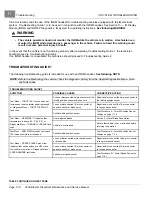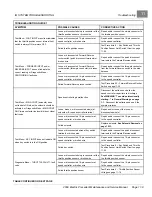
IQ SYSTEM TROUBLESHOOTING
Test Procedures
11
4.5. If any other reading is obtained, replace the key switch.
See Key Switch Removal on page 15-1.
4.6. If the key switch operates as described in the previous steps, install the instrument panel in the reverse
order of removal and proceed to the following step.
5.
Test the throttle position sensor limit switch.
See following NOTE.
NOTE:
Make sure that the key switch is operating correctly and that the key switch and instrument panel are properly
installed before proceeding.
5.1. With batteries connected and using a multimeter set to 200 volts DC, place the black (–) probe on the
battery no. 4 (4 x 12-Volt battery set) or battery no. 6 (6 x 8-Volt battery set) negative post and place the
red (+) probe (with insulation-piercing probe) on the green wire close to the six-pin connector on the
throttle position sensor.
See following WARNING.
WARNING
• The Forward/Reverse switch must be in the neutral position to avoid personal injury due to contact
with rotating wheels.
5.2. With Tow/Run switch in the RUN position, key switch in the ON position, and Forward/Reverse rocker switch
in the NEUTRAL position, the voltage reading should be zero volts. When the accelerator pedal is pressed,
the voltage reading should be approximately 48 volts (full battery voltage).
5.3. If the voltage reading is 48 volts when the accelerator pedal is not pressed, replace the accelerator pedal
assembly.
See Accelerator Pedal Removal on page 5-3.
5.4. If the voltage reading is zero volts when the accelerator pedal is pressed, check for voltage to the limit
switch using the following test procedure.
5.4.1. Using a multimeter set to 200 volts DC, place black (–) probe on battery no. 4 (4 x 12-Volt battery
set) or battery no. 6 (6 x 8-Volt battery set) negative post and the place red (+) probe (with
insulation-piercing probe) on the blue wire where it connects to the throttle position sensor. With the
key switch ON, the reading should be approximately 48 volts (full battery voltage).
5.4.2. If the reading is zero volts, check the continuity of the blue wire that goes from the key switch to
the throttle position sensor.
5.4.3. If the reading is approximately 48 volts, replace the accelerator pedal assembly.
See Accelerator
Pedal Removal on page 5-3.
TEST PROCEDURE 9 – 16-Pin Connector
See General Warnings on page 1-1.
1.
Disconnect the battery cables and discharge the controller as instructed.
See WARNINGS “To avoid
unintentionally starting...” and “After disconnecting the batteries, wait 90 seconds...” in General
Warnings on page 1-1.
2.
Disconnect the 16-pin connector from the speed controller. Inspect terminal ends inside plug to ensure they are in
position and seated in plug housing. If any terminals look like they are not pushed all the way into the connector,
gently push the terminals until they are firmly seated in the 16-pin connector. After each terminal has been
pushed into the housing, gently pull on the wire to ensure it is locked into place.
3.
Check wires in the plug to make sure none are broken at the terminal pin crimp. Repair or replace as required.
4.
Check the wire colors of each wire and make sure that the colors for each pin position match the wire colors in the
wiring diagram.
See Wiring Diagrams on page 11-2.
5.
When connecting the 16-pin connector to the controller, push plug into controller receptacle with enough force to
lock plug into place. An audible click will be heard when plug is properly seated to the controller.
2009 Electric Precedent Maintenance and Service Manual
Page 11-21






























